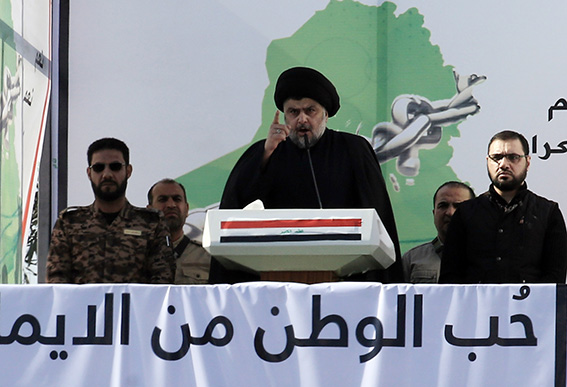
The influential Muqtada al-Sadr’s coalition, known as Sa’iroun emerged as the most successful bloc in the elections (Photo: Ali Mohammed/AA)
Mohammed Al-Jumaily
Two months on from Iraq’s Parliamentary elections held on May 12, the country is without a government, leaving the situation more uncertain than ever.
The Electoral Commission has also become embroiled in controversy and has had its authority suspended after widespread allegations of voter fraud, which in turn has led to the country’s legislature and Supreme Court voting to conduct a manual recount.
The country remains without a government, parliament or a clear idea of the final election results. However, despite the uncertainty, the major parties have been active in trying to form alliances in a bid to determine and remain part of the next government.
The preliminary results provided a shock that rocked Iraq’s political elite and was the most significant sign yet of the Iraqi public’s overwhelming dissatisfaction with the status quo and the country’s political establishment.
The elections recorded the lowest turnout since 2003, with just 45 per cent, which allowed the influential Muqtada al-Sadr’s coalition, known as Sa’iroun, to emerge as the most successful bloc in the elections winning an estimated 54 seats in the Iraqi Parliament.
Sa’iroun were followed by the Fatah Coalition, made up of groups in the Popular Mobilisation Unit (PMU) such as the Badr Organisation and Asa’ib Ahl al-Haq, and led Hadi al-Amiri groups, with 47 seats. Meanwhile, the incumbent Prime Minister, Haider al-Abadi’s Nasr Coalition came in third with 42 seats.
The success of Sadr, whom many people regard as the main anti-establishment figure in Iraqi politics, has put him in a uniquely strong position in negotiations to form the next government. Political blocs need to have 165 seats in parliament in order to have a majority and form a stable government.
As a result, al-Sadr has been active in his negotiations with other political parties. He took the initiative by forming an new alliance with Ammar al-Hakim, the former leader of the Islamic Supreme Council of Iraq and now the current leader of the more secular Hikma Movement, which won 19 seats in the elections, as well as former Prime Minister, Ayad Allawi, the leader of the Al-Wataniya Coalition, made up of a number of secular and Sunni parties, which won 21 seats in parliament. This cross-sectarian alliance, dubbed the National Paternal Alliance, with 94 seats put Sadr in an even more dominant position.
However, in another unexpected twist, Al-Sadr, after weeks of talks with Amiri, entered into an alliance with the Fatah Coalition. al-Sadr has long held a stance against armed groups participating in the country’s political process, which has, at times, put him at loggerheads with key figures in the PMU including Hadi al-Amiri. In addition to this, Al-Sadr has also been very critical of both the US and Iran’s influence in Iraq. Therefore, an alliance with Fatah, led by the staunch allies to Iran, al-Amiri and Qais al-Khazali, whose relationship to Sadr has been particularly hostile over the years, presents a massive shock to the current political dynamics in Iraq.
To add to this, on June 23, al-Abadi met with al-Sadr to form a “cross-sectarian, cross-ethnic alliance” between the two in a bid to speed up the formation of a new government as soon as the election results are officially announced. This new national alliance, bringing together the three largest parties along with Sunni and secular blocs will be large enough to form a majority government, with 183 seats.
However, while al-Sadr hails the new alliance as a move in the “spirit of patriotism”, it draws further questions about his stance towards Tehran as well as the direction of the country’s future government. While the alliance has managed to unite different political blocs and interests, it is uncertain how long this could possibly last, given their stark ideological differences and the divergent political visions that the different groups have. For example, both the Al-Wataniya Coalition and the Hikma Movement have made their antagonistic relationship towards the Fatah Coalition and its leading figures clear for all Iraqis to see. Meanwhile, Al-Abadi’s loyalty to the Islamic Dawa Party is still seen as a significant point of contention for many parties in this coalition and has been identified as the main obstacle preventing a unanimous acceptance of Al-Abadi retaining his post as Prime Minister.
Furthermore, with the vast majority of parties in this coalition made up of predominantly Shia Muslim parties, Iraq’s minority sects may see the coalition as a clear contradiction to Al-Sadr and Al-Abadi’s calls for a cross-sectarian government. Many would view the latest developments as attempts to bring a sectarian government back on the agenda, which in turn would further alienate minority groups, and bring to the fore sectarian tensions, which appear to have quelled since the defeat of Daesh by the Iraqi Government.
Another implication overlooked in the latest coalition formations is the supposed exclusion of Kurdish parties and, more surprisingly, former Prime Minister, Nouri al-Maliki, who has increasingly fallen out of favour in Iraq’s political scene. If a coalition comprising of Nasr, Fatah, Sa’iroun, Hikma and Wataniya is formed, Maliki’s State of Law Coalition, which suffered the most in the elections and gaining only 25 seats (from 92 in 2014), will no longer be needed to form a government. This could spell the end of Maliki’s influence in Iraqi politics. Moreover, the exclusion of Kurdish parties from the new government could further fuel Kurdish resentment and animosity towards Baghdad and potentially harm reconciliatory efforts between the Iraqi Government and the Kurdistan Regional Government.
While the recent alliances may well speed up the government formation process, many questions remain about how Al-Sadr, Al- Abadi and Al-Amiri will keep such a broad coalition together and create a unified vision for how the country should be run. Moreover, as the controversy over alleged election malpractice further delays election results and alliances remain in flux, uncertainty will continue to loom over Iraq.